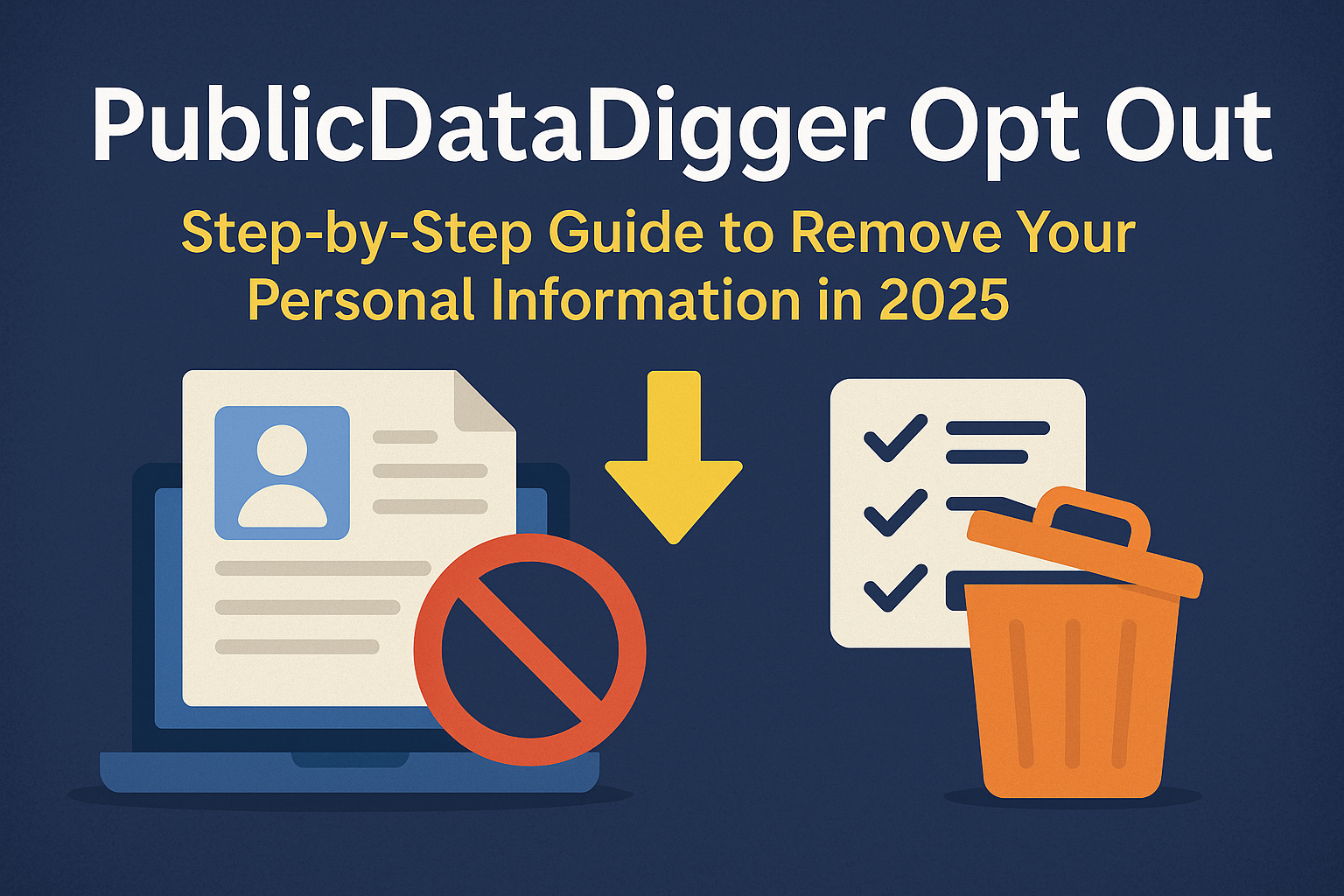What is PublicDataDigger?
PublicDataDigger is a data broker site that collects and displays personal information pulled from public records. Listings may include:
- Full names and aliases
- Home addresses and past residences
- Phone numbers and email addresses
- Relatives and associated persons
- Court filings and property records
The site monetizes traffic by selling detailed reports and subscriptions to individuals seeking background information.
Why PublicDataDigger Poses Privacy Risks
While the data may be technically public, its aggregation creates new risks:
- Identity theft – Exposed addresses and birthdates make it easier for fraudsters.
- Harassment – Stalkers and scammers exploit accessible contact details.
- Employment issues – Employers may stumble on outdated or inaccurate records.
- Family safety – Publishing addresses increases risks for households.
“Once your data is indexed by a broker like PublicDataDigger, it can spread across dozens of other websites.”
How Does PublicDataDigger Get Your Information?
PublicDataDigger sources data from:
- County and state public records
- Property ownership databases
- Court and criminal filings
- Voter registration records
- Commercial data brokers
Once aggregated, this information is packaged into online profiles searchable by name.
Why Opting Out is Important
Opting out of PublicDataDigger limits exposure and helps prevent your data from circulating further. However, because data is shared across multiple brokers, a single opt out doesn’t eliminate all risks.
Step-by-Step Guide: PublicDataDigger Opt Out
Step 1: Locate Your Listing
- Visit PublicDataDigger’s search page.
- Enter your full name and city/state.
- Record the URL of your listing for removal.
Step 2: Access the Opt Out Page
PublicDataDigger provides a privacy removal form. Look for:
https://www.publicdatadigger.com/optout
Step 3: Complete the Opt Out Form
- Provide your full name.
- Copy and paste the exact profile URL.
- Enter a valid email address for confirmation.
Step 4: Confirm by Email
- Check your inbox for a confirmation message.
- Click the verification link.
- Without confirmation, removal may not process.
Step 5: Allow Processing Time
Removals typically take 7–14 business days. Monitor Google results to ensure your listing disappears.
What If PublicDataDigger Doesn’t Remove Your Data?
If the site refuses or delays:
- Re-submit the form with accurate details.
- Contact support directly if available.
- File a complaint with the FTC under privacy rights if necessary.
Limitations of the Opt Out Process
Even after removal:
- Cached versions of your listing may remain on Google or Bing.
- Your information may still appear on partner sites.
- Future public filings can repopulate the database.
This makes ongoing monitoring essential.
How to Suppress Cached PublicDataDigger Pages
Use Google’s removal tool to address outdated pages:
https://search.google.com/search-console/remove-outdated-content
Submit the profile URL and request that Google clears cached information.
Broader Data Broker Network
PublicDataDigger is just one of many similar sites. Others include Whitepages, Spokeo, PeopleFinder, and dozens of niche databases. Opting out of one site does not remove you from the network.
That’s why comprehensive removal strategies are required.
Advanced Privacy Protection Strategies
Freeze Your Credit Reports
Prevent fraud by freezing your reports at:
Use Privacy Tools
- VPNs to mask your IP address.
- Privacy-focused browsers like Brave or Firefox.
- Encrypted email services like ProtonMail.
Monitor Exposure
- Set Google Alerts for your name, phone number, and address.
- Regularly audit your information on people-search sites.
How Remove Online Information Can Help
Handling dozens of opt out requests across multiple sites is tedious and time-consuming. Remove Online Information provides:
- Bulk removals from dozens of data brokers, including PublicDataDigger.
- Suppression of cached search results.
- Continuous monitoring for new exposures.
- Tailored solutions for professionals, families, and individuals.
📌 Take control today: Visit Remove Online Information to remove your data from PublicDataDigger and beyond.
Case Study
“Anthony,” a small business owner, found his home address and phone number on PublicDataDigger. After manually opting out, his information reappeared on related broker sites. By working with Remove Online Information, Anthony achieved bulk removals and ongoing monitoring, protecting his family’s privacy.
FAQ Section
Yes, it operates legally by publishing public records, but privacy concerns remain.
Usually 7–14 days, depending on processing.
Yes, submit all profile URLs in your request.
No, it only removes the display from the site. Public records remain accessible.
Yes, especially if new public records are filed. Monitoring is required.
Google can only remove cached pages, not original listings.
No, it is a third-party data broker.
Some brokers require ID, but PublicDataDigger typically relies on email verification.
It may still exist. Try searching with variations of your name or old addresses.
ROI provides bulk removals, monitoring, and suppression strategies, ensuring stronger long-term privacy protection.
Yes. Consent is not required because the site relies on publicly available records.
Not always. New public filings (such as property deeds or voter registration) may trigger reappearance.
No. Opt outs are free, but some people use professional services for faster, bulk removals.
Quick Checklist
- ✅ Search for your profile on PublicDataDigger
- ✅ Copy the listing URL for removal
- ✅ Submit the opt out form with your details
- ✅ Confirm removal via email
- ✅ Request Google to delete cached pages
- ✅ Monitor reappearances and related broker sites
- ✅ Consider professional help for ongoing protection
Safeguarding Your Privacy in 2025
Data brokers like PublicDataDigger profit from exposing personal records, but you have the right to reclaim control. Opting out is a crucial first step, but true protection requires persistence and proactive monitoring.
With Remove Online Information, you can ensure bulk removals, reputation repair, and lasting privacy protection.
👉 Start today: Visit Remove Online Information and take back your data.
Works Cited (MLA Format)
Electronic Frontier Foundation. Surveillance Self-Defense. EFF, 2025, https://ssd.eff.org/.
Federal Trade Commission. Protecting Personal Information: A Guide for Consumers. FTC, 2025, https://www.consumer.ftc.gov/.
Google. Remove Outdated Content. Google Support, 2025, https://search.google.com/search-console/remove-outdated-content.
National Conference of State Legislatures. Data Broker Regulation. NCSL, 2025, https://www.ncsl.org/.

